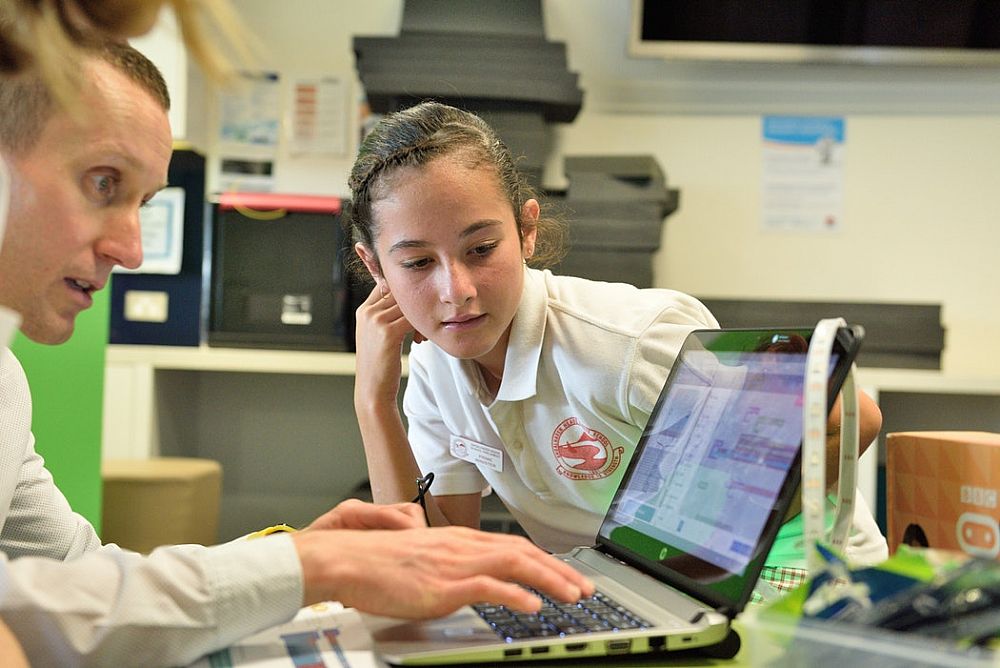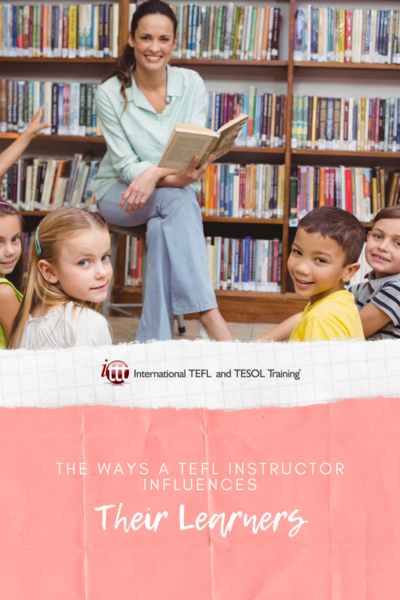The Ways a TEFL Instructor Influences Their Learners

Teachers are people who help, motivate, and encourage students to acquire knowledge. Their role in society should not be underestimated, as they tend to have a significant influence on student achievement, discipline, and overall intelligence. Many personality characteristics can be linked with a good teacher, such as their ability to be kind, patient, lively, knowledgeable, and caring amongst many other things. Their primary role in the classroom, however, should be to effectively encourage learning. Almost everyone can name a teacher who stands out amongst the rest not because they gave easy A's, but rather due to their ability to fully engage and inspire their class.
Table of Contents
Choice of Activities and Teacher's Roles
Do you want to teach English abroad? Take a TEFL course!
This post was written by our TEFL certification graduate Remy M. Please note that this blog post might not necessarily represent the beliefs or opinions of ITTT.
Classroom Environment
At the beginning of class, to make the classroom environment adequately enjoyable for students, a teacher should first establish rapport with their students. More students will be motivated to contribute and participate in class activities when everyone in the class knows each other and can communicate well. To ensure this classroom harmony, the teacher should know all of the students' names. They can also administer ice-breaker activities so that the students of the class can get to know each other better, as well as allow the students to help and correct each other. Further, the teacher can cater activities to the class so that the learning feels more personal to the students themselves. When a teacher can effectively establish rapport with their students, they can create a more relaxed and enthusiastic learning atmosphere.

Also Read: How much can I earn teaching English in China?
Preparation
A teacher must also be able to appropriately plan a lesson, which can be a difficult task in itself. Planning an entire lesson verbatim can be too restricting and inflexible, however planning absolutely nothing can lead to an unorganized and chaotic class period. A good lesson plan should include specific learning objectives or goals that the teacher wants the students to be able to achieve by the end of the lesson. From there, the teacher should be able to incorporate activities with various aims that allow the students to practice both language accuracy and fluency. Predicting activity timing is another important component of a lesson plan to ensure that all of the class time is being used effectively. Further, the teacher should try to anticipate potential classroom problems before the lesson begins, whether they be with the students themselves or with classroom machinery, in an attempt to use class time as efficiently as possible.
Lesson Structure
There are three primary components of a lesson plan that a teacher should implement every day to provide a sense of flexibility and variety to the class, primarily to keep students motivated and intrigued in the subject material. The first of these three is the Engage Phase, and its purpose is to get students excited about the upcoming lesson. This phase can consist of games, stories, music, and other fun activities that get the students thinking about English without really learning. The second of the three is the Study Phase, which involves learning English and the construction of language. This phase restricts language specifically to what the students are learning through activities including worksheets, language exercises, and pronunciation drills. The third is the Activate Phase, which focuses on using the learned language to improve communication fluency. This phase uses role-playing, story-telling, and other communication-based activities without any restriction on the language used to enhance the flow of speaking. While all three of these phases must be included in any given lesson plan, it is up to the teacher to decide the ultimate order, specific activities, and a number of each included.

Also Read: What is the Central European Teaching Program CETP for teaching English in Hungary?
Choice of Activities and Teacher's Roles
To effectively teach a class, there are many sub-positions a teacher must master to fully encourage student learning. The specific role of the teacher should depend directly on both the subject matter and class activity at hand. A teacher can act as a Controller when they remain the dominant lecturer, which can have its place in all three phases of a lesson but should not be overused. On the contrary, a teacher can also act as a Participant where they participate in a class activity or lesson as equal. The Organizer role involves working to organize the class into groups and activities, and the Observer role allows teachers to monitor students without interrupting them during individual activities. A teacher can act as a Prompter to help and encourage students, as well as an Assessor to provide feedback and correction. A teacher should always act as a Model, where they provide an example of perfect and authentic English. The specific role that a teacher will play at a given time will depend heavily on the activity that the class carries out. They should be able to readily adapt to the classroom atmosphere, as well as the components of the lesson plans they administer and switch between these roles effectively and appropriately.
Confidence Building
One of the teacher's primary aims in the classroom should be to inspire confidence in their students, and there are various techniques they should implement to increase both student motivation and responsibility. Student participation is the best reflection of student motivation to learn within a class, so while the teacher must maintain authority and lecture, it is also important for teachers to avoid excess speaking time for themselves to encourage more student involvement. Further, teachers should constantly provide feedback and correction to students to encourage self-awareness and language improvement, however, they need to remain sensitive to prevent student discouragement in learning. Too much correction can be off-putting to students, however too little is unhelpful for student learning and progress. There are a specific time and place for correcting student errors, however, the teacher should know to always look for positive input to avoid interrupting their motivation to learn.
Do you want to teach English abroad? Take a TEFL course!
A teacher's primary role in the classroom should be to encourage, inspire, and motivate their students to learn. They should be able to form strong relationships with their students to promote a degree of enthusiasm for learning in the classroom, and further establish a sense of harmony and togetherness within their class. Teachers should also be organized and ready for each class with a variety of well-prepared lesson plans that will keep the students engaged and involved with the subject material. With every sub-position that a teacher commits to, whether it be from the perspective of a Controller or a Prompter, a teacher should be wary of their students' capabilities and perceived learning progress so not as to interrupt their progress or discourage them from learning. A great teacher is one that positively impacts their students and inspires them to continue learning.
Apply now & get certified to teach english abroad!
Speak with an ITTT advisor today to put together your personal plan for teaching English abroad.
Send us an email or call us toll-free at 1-800-490-0531 to speak with an ITTT advisor today.
Related Articles:
- Top 10 Cities in Asia with the Highest Demand for English Language Teachers
- 6 Steps to Becoming a TEFL Trainer
- 5 Important Things to Prepare You for Teaching English in Hanoi
- What's it Like Teaching EFL in a Kindergarten in Vietnam?
- Top 5 Off-The-Beaten-Track Countries for Teaching English Abroad
- 5 Great Ways to Give Your Students Feedback




